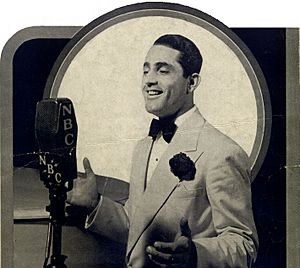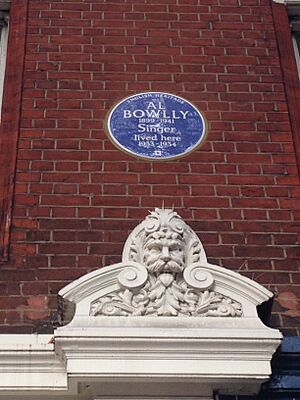Al Bowlly facts for kids
Quick facts for kids
Al Bowlly
|
|
|---|---|
 |
|
| Background information | |
| Birth name | Albert Allick Bowlly |
| Born | 7 January 1898 Lourenço Marques, Portuguese Mozambique |
| Died | 17 April 1941 (aged 43) London, England |
| Genres | Jazz, vocal |
| Occupation(s) | Singer, songwriter, bandleader |
| Years active | 1927–1941 |
Al Bowlly (born Albert Allick Bowlly) was a famous singer and jazz guitarist. He was born in Mozambique, grew up in South Africa, and became very popular in Britain during the 1930s. He recorded over 1,000 songs!
Some of his most well-known songs include "Midnight, the Stars and You", "Goodnight, Sweetheart", "Close Your Eyes", and "The Very Thought of You". He even recorded the only English version of the Russian song "Dark Eyes", which he called "Black Eyes".
Contents
Early Life and Beginnings
Al Bowlly was born in 1898 in Lourenço Marques, which was then a Portuguese colony in Mozambique. His father was Greek, and his mother was Lebanese. They met while traveling to Australia and later moved to South Africa, where Al grew up in Johannesburg.
First Steps in Music
After trying different jobs in South Africa, like being a barber and a jockey, Al Bowlly started singing in a dance band. This band, led by Edgar Adeler, toured places like South Africa, Rhodesia, India, and the Dutch East Indies in the mid-1920s. He later joined another band with Jimmy Liquime, singing in India and Singapore.
In 1927, Al Bowlly made his very first record. It was a cover of "Blue Skies" by Irving Berlin, recorded in Berlin, Germany. The next year, he worked in London with the orchestra of Fred Elizalde.
Rise to Stardom in the 1930s
When the Great Depression hit in 1929, Al Bowlly lost his job. For several months, he had to sing on the streets to make money. But his luck changed in the 1930s.
Signing Big Contracts
In 1931, he signed two important contracts. One was with Roy Fox, to sing live with his band at the fancy Monseigneur Restaurant in London. The other was a record deal with bandleader Ray Noble in 1930.
Over the next four years, Al Bowlly recorded more than 500 songs. By 1933, Lew Stone became the new bandleader at the Monseigneur. Bowlly sang with Stone's band, and thanks to lots of radio play and a successful tour, he became very popular. Everyone wanted him to perform!
Busy Schedule and Voice Issues
Al Bowlly was incredibly busy. He often spent his days in the recording studio with Ray Noble's band, and his evenings performing with Lew Stone's band. Many of his recordings with Noble were released in the United States, making him famous there even before he visited.
He also performed in England with his own band, the Radio City Rhythm Makers. However, by 1937, his band broke up because he started having problems with his voice. Doctors found a wart in his throat, which made him briefly lose his voice. He had to borrow money to travel to New York City for surgery.
Return to Britain
Being away from the UK for a while affected his popularity with British audiences. His voice problems also meant he recorded less often. He had small parts in movies, but they were usually cut short. Ray Noble got a job in Hollywood, but they already had a singer, so Al Bowlly wasn't included. He moved back to London with his wife, Marjie, in 1937.
With less success in Britain, he toured smaller theaters and recorded as much as he could to earn a living. He worked with different orchestras, including those led by Sydney Lipton, Geraldo, and Ken "Snakehips" Johnson. In 1940, people became interested in his music again when he performed with Jimmy Messene in a show called Radio Stars with Two Guitars. This was his last big project before he died in 1941.
Al Bowlly recorded his very last song just two weeks before his death. It was a duet with Jimmy Messene of Irving Berlin's song about Adolf Hitler, called "When That Man Is Dead and Gone".

Personal Life and Tragic Death
In December 1931, Al Bowlly married Constance Freda Roberts, but they separated quickly. He remarried in December 1934 to Marjie Fairless, and they stayed together until his death.
On April 16, 1941, Al Bowlly performed with Jimmy Messene in High Wycombe. They were offered a place to stay overnight, but Al decided to take the last train home to his flat in London.
Sadly, he was killed early the next morning, on April 17, 1941. A Luftwaffe (German air force) bomb exploded outside his flat during World War II. The explosion blew his bedroom door off its hinges, and the impact against his head was fatal. He was buried in a mass grave with other bombing victims at Hanwell Cemetery.
In November 2013, a special blue plaque was placed on Charing Cross Mansion, where he lived. It says "Al Bowlly lived here," marking his home during the peak of his career.
Legacy and Influence
Al Bowlly's songs have been used in many movies and TV shows. Some musicians believe that if he hadn't died in the war, he would have been even more famous than Bing Crosby, saying he had a better voice.
His music was featured in the TV series Pennies from Heaven (1978). He and his songs were also mentioned throughout the British TV comedy Goodnight Sweetheart.
Al Bowlly's song "Midnight, the Stars and You" is especially famous for its use in the movie The Shining. It also appeared in Toy Story 4 and Ready Player One. People often describe its use in The Shining as "haunting" and "unforgettable". The song was also used in the 2013 video game BioShock Infinite: Burial at Sea.
Another of his songs, "Heartaches", was sampled many times by the musician The Caretaker (Leyland Kirby) in his album series Everywhere at the End of Time. This series explored the effects of dementia by distorting and changing old big band songs. The opening track of Stage 1 is called "It's Just a Burning Memory", which comes from the lyrics of "Heartaches".
The musician Richard Thompson wrote a song called 'Al Bowlly's In Heaven' for his album Daring Adventures.
Al Bowlly and his music are also mentioned in these novels:
- A Good Clean Fight by Derek Robinson
- The Eagle Has Flown by Jack Higgins
Partial Discography
| Song | Year |
|---|---|
| "If I Had You" | 1928 |
| "Time on My Hands" | 1931 |
| "Heartaches" | 1931 |
| "Goodnight, Sweetheart" | 1931 |
| "Guilty" | 1931 |
| "Lullaby of the Leaves" | 1932 |
| "Looking on the Bright Side of Life" | 1932 |
| "Love Is The Sweetest Thing" | 1932 |
| "My Woman" | 1932 |
| "What More Can I Ask?" | 1932 |
| "Hustlin' and Bustlin' for Baby" | 1933 |
| "Isn't It Heavenly" | 1933 |
| "Close Your Eyes" | 1933 |
| "True" | 1934 |
| "Midnight, the Stars and You" | 1934 |
| "The Very Thought of You" | 1934 |
| "Isle of Capri" | 1934 |
| "Blue Moon" | 1935 |
| "Dinner for One Please, James" | 1935 |
| "It's a Lovely Day Tomorrow" | 1940 |
See also
 In Spanish: Al Bowlly para niños
In Spanish: Al Bowlly para niños
 | Delilah Pierce |
 | Gordon Parks |
 | Augusta Savage |
 | Charles Ethan Porter |

